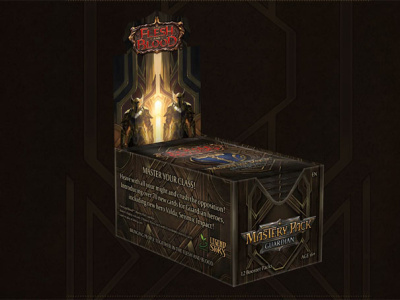 Barratt Moy of Games +1 in Davenport, Iowa and Underhill's Games in Cuyahoga Falls, Ohio read Dan Yarrington's recent column on the role of game distributors (see "Get In The Game--Should Distribution Die?") and had this to say.
Barratt Moy of Games +1 in Davenport, Iowa and Underhill's Games in Cuyahoga Falls, Ohio read Dan Yarrington's recent column on the role of game distributors (see "Get In The Game--Should Distribution Die?") and had this to say.Maybe we should look at this question from the broader perspective. In all of consumer products and retail that is dominated by small players, you will have high service distributors that warehouse and pick product.
For instance, restaurants (lots of small single site operations -- sound familiar?), the advent of DOT Foods has allowed even the smallest restaurants and cafes to order food service type items down to single bottles of ketchup, mayo, etc. from EVERY different manufacturer that is out there; sure the prices are higher, but you are not stuck ordering cases of product that have a shelf life and you are not limited to the products that a certain food service company prefers (forced to buy house brands). Before this development, most places had to order everything from a single food service vendor like Aramark or Sysco, where they would limit your ordering to full cases of product, limit some product lines to their house brands and require orders to be at least half a pallet to even sell to you; with "Plan B" as cutting a deal with a local grocery store to get special orders, which is time and price intensive.
Now expand that into logic into the games industry. Our distributors are like DOT Foods and our stores are like those individually owned/operated restaurants and cafes. Our distributors actually go a step further and often warehouse for manufacturers/publishers. If the distributors go under, it will become a DIRE situation for most of the smaller manufacturers/publishers, they will have to develop logistics, warehousing, fulfillment and more accounts receivable/collections departments. The additional overhead will most likely kill these manufacturers or reduce them to PDF offerings online.
One point that is key is the issuance of credit by distribution to retail. How many game/comic retailers can actually borrow money from a bank? How many game/comic retailers have a Dunn and Bradstreet credit rating? How many game/comic retailers actually have a credit card that is in the STORE NAME without somebody being PERSONALLY LIABLE if the company defaults? My guess is that those numbers are in the single digits, if at all. So, it might be about the capability to go direct, rather than the desire to do so.
The ability for the retailers to "sample" new items by buying single copies of it, the credit graciously given by distribution, the service of mixing products from various manufacturers into single shipments and the ability to refill at the last minute are all valuable services the distribution provides and should not be overlooked as "valueless" to retailers.
In summary, the distribution tier provides significant value and service for both the retailers and manufacturers. They deserve their piece of the pie and will continue to get it, as long as our market is dominated by small retailers and small manufacturers in need of a logistics, distribution and credit network.
The opinions expressed in this article are solely those of the writer, and do not necessarily reflect the views of the editorial staff of ICv2.com.







